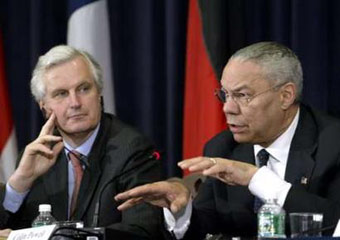|
France: US must accept end of occupation
(Agencies)
Updated: 2004-05-15 10:15
The United States must accept that its occupation of Iraq will end when it transfers power to an interim Iraqi government on June 30, even though U.S. troops will lead the force that stays in the country, the French foreign minister said.

U.S. Secretary of State Colin Powell (R) talks as French Foreign Minister Michel Barnier listens during a news conference after a G-8 ministers meeting at the State Department in Washington, May 14, 2004. [Reuters] |
Michel Barnier said the Bush administration needs to understand that there must be "a real break" and that the caretaker Iraqi government must be consulted about the movements and operational use of the multinational force.
Barnier spoke Thursday at a news conference after a working dinner with U.N. Secretary-General Kofi Annan which focused on efforts by U.N. envoy Lakhdar Brahimi to put together an acceptable transitional government to assume sovereignty from the U.S.-led coalition.
He heads to Washington Friday for a meeting of foreign ministers of the Group of Eight major industrialized nations, where Iraq will also lead the agenda.
France was a staunch opponent of the war in Iraq, and Barnier ruled out sending any French troops to be part of the multilateral force. But he said France will work "in a constructive spirit" on a new U.N. resolution dealing with the transfer of sovereignty, and he stressed that France and America "have always been friends and allies."
The U.N. Security Council has been holding informal discussions on the elements that need to be in a new resolution. No draft is expected until after Brahimi returns from Baghdad and makes his final recommendations on the makeup of a caretaker government.
"We have to make sure that this government has all the levers of sovereignty and control," Barnier said. "What we need is for the Americans and the occupation forces to understand and accept this real break on July 1 — and the break will be confirmed with the elections in January."
"The Iraqi government has to be in a position to manage its affairs, to handle the economy, the justice, manage its natural resources, manage the internal security forces — at least the law enforcement officials. And also, it has to have a say in the use of the multilateral force that will be in Iraq from July until January," he said.
Barnier, making his first trip to the United States as foreign minister, said "the most sensitive issue" in the discussions on a new resolution is the relationship between the interim government and the multinational force.
After elections in January, when a "fully legitimate government" will be elected, he said, "it will be that government's duty to say whether the multilateral force should stay on or not."
But Barnier stressed that the period between July and January was a "blurred period" that the Security Council would have to discuss in depth.
|